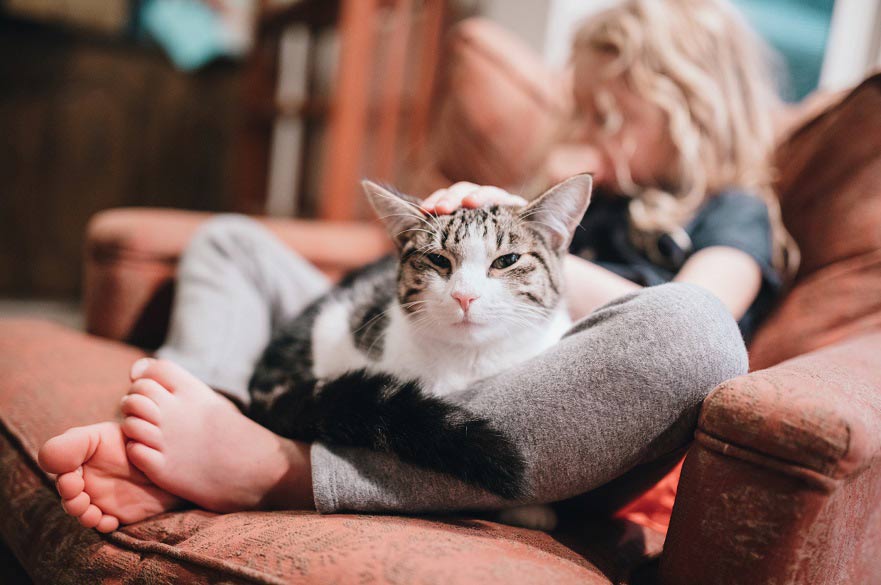Do copy cats really exist? New study shows that cats may reflect their owner’s personality
There is a relationship between cat owner’s personalities and the behaviour and health of their pets, a new study suggests.

Research carried out by Nottingham Trent University and the University of Lincoln investigated the relationship between different personalities of cat owners and the behaviour and wellbeing of their furry friends.
The findings suggest that, just as a parent’s personality can affect the personality of a child, the same could be true for a cat and their owner.
The research published in the journal PLOS ONE involved surveying more than 3,000 predominantly UK-based cat owners.
As part of the study, the researchers asked questions about owners’ personalities, as well as their cat’s behaviour, health and lifestyle.
The results indicated potential parallels with previous research conducted on parent-child relationships.
Previous studies have found that greater parental neuroticism scores are generally associated with less positive wellbeing outcomes for children, whilst agreeableness, conscientiousness, openness and extraversion are associated with more positive parenting styles and child welfare.
The study found that there could be a potential parallel in cats, with higher levels of neuroticism in cat owners associated with more negative wellbeing of their pets.
It was found that owners who scored higher on the neuroticism scale were more likely to report their cats as having a ‘behavioural problem’, displaying more aggressive and anxious/fearful behavioural styles and more stress-related sickness behaviours, as well as having an ongoing medical condition and being overweight.
The research also indicated a relationship between positive owner personality traits. For example, higher owner conscientiousness, was generally found to be associated with more positive parallels with cats, displaying less anxious, aggressive and avoidant behavioural styles.
Dr Lauren Finka, Postdoctoral researcher in animal welfare in Nottingham Trent University’s School of Animal, Rural and Environmental Sciences, and co-author of the study said: “Many owners consider their pets as a family member, forming close social bonds with them.
“It’s therefore very possible that pets could be affected by the way we interact with and manage them, and that both these factors are in turn influenced by our personality differences.
“The majority of owners want to provide the best care for their cats, and these results highlight an important relationship between our personalities and the wellbeing of our pets.
“Further research is needed to investigate the causal nature of this relationship – and to look at if, and how, owner personalities are directly influencing their cat’s behaviour and welfare.”
Nottingham Trent University Associate Professor Mark Farnworth said: “More and more we are learning that the welfare of pets is driven by the underlying nature of the owner, and not simply by their conscious decisions and behaviours.”
-
Notes for editors
Press enquiries please contact Dave Rogers, Public Relations Manager, on telephone +44 (0)115 848 8782, or via email; or Chris Birkle, Public Relations Manager, on telephone +44 (0)115 848 2310, or via email.
Nottingham Trent University (NTU) was named University of the Year 2017 at the Times Higher Education Awards, and Modern University of the Year in the Times and Sunday Times Good University Guide 2018. These awards recognise NTU for its high levels of student satisfaction, its quality of teaching, its engagement with employers, and its overall student experience.
NTU has been rated Gold in the Government’s Teaching Excellence Framework – the highest ranking available. NTU is one of the largest UK universities. With 30,000 students and more than 4,000 staff located across four campuses, the University contributes £900m to the UK economy every year. It is one of the UK’s most environmentally friendly universities, containing some of the sector’s most inspiring and efficient award-winning buildings. 96% of its graduates go on to employment or further education within six months of leaving. Student satisfaction is high: NTU achieved an 88% satisfaction score in the 2018 National Student Satisfaction Survey.
The University is passionate about creating opportunities and its extensive outreach programme is designed to enable Nottingham Trent to be a vehicle for social mobility. NTU is among the UK’s top five recruiters of students from disadvantaged backgrounds.
NTU is home to world-class research, and won The Queen’s Anniversary Prize in 2015 – the highest national honour for a UK university. It recognised the University’s pioneering projects to improve weapons and explosives detection in luggage; enable safer production of powdered infant formula; and combat food fraud. With an international student population of over 3,000 from around 100 countries, the University prides itself on its global outlook.
- Subject area: Animal, equine and wildlife
- Category: Press office; Research; School of Animal, Rural and Environmental Sciences


